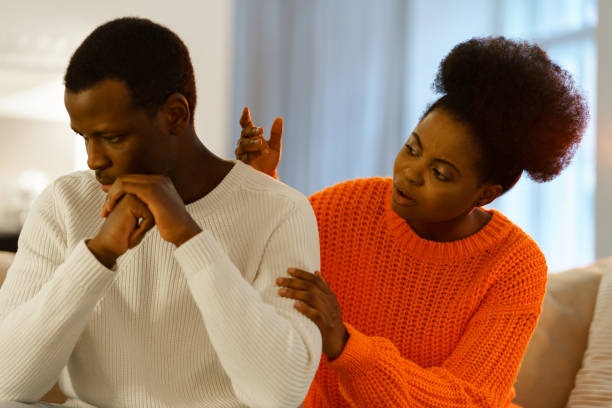Sex & Relashionships
10 Signs You Are The Less Affectionate Partner

Love remains the most important factor in any relationship. It keeps the romance alive and strengthens the bond between partners. However, people fall out of love during a romantic relationship for various reasons.
The level of affection shown in a relationship can vary from person to person. While there are partners who are ready to go the extra mile,there are those whose love is limited. Here are 10 signs that show you are the less affectionate partner.

You Don’t Spend Much Time With Your Partner
While buying gifts and romantic gestures are important, Spending quality time together is just as important. It could be physical or virtual time; quality time keeps relationships active. When you start spending less time with someone you care about, it means something is wrong somewhere.
You Are Unhappy Around Them
You could also spend time with your partner and not enjoy it. The aim of social outings and companionship is to cheer each other up and connect. But when you are not happy anytime you are with your partner, it could mean your heart is somewhere else.
Your Partner’s Needs Aren’t Important
Another clear sign that you are the less loving partner is when you prioritise other people’s wants above your partner’s. In a serious relationship, your partner’s needs should supersede any other person’s wants.

Your Plans Doesn’t Align With Theirs
While everyone’s goals and aspirations differ, lovers in a relationship often find ways to align their goals. However, when you start noticing your plans and future aspirations are drifting in different directions., it is a bad sign.
You Don’t Like Resolving Conflicts
No relationship is perfect, and there will always be clashes and arguments. However, when you truly love someone, you’re usually willing to make things right. If resolving issues with your partner doesn’t interest you, it could be a sign that your affection has faded.
Read Also : Unbelievable Breakup Tips That Actually Work
Less Communication
Communication is the fuel that keeps relationships running. Partners who want to build a healthy relationship make communication a priority. But when you reduce the time you speak with your partner, it often reflects a decline in emotional connection.

You Don’t Tell Them How Much They Mean To You
Everyone wants assurance from someone they love and trust. While actions are important, many people — especially women — also value verbal affirmation. If you struggle to say ‘I love you’ or express how much they mean to you, it could suggest emotional distance.
You Don’t Share Your Feelings.
Hesitating to share your feelings is another way to know you don’t have affection for your partner. Once you are in a committed relationship, sharing thoughts and feelings is necessary. But once you are reluctant to share them, it can be a sign that your emotional connection is weakening
You Reject Your Partner’s Sexual Advances
A relationship without intimacy will likely hit the rocks. When you don’t want to be sexually close to your partner, something is wrong. it may signal emotional or physical detachment — possibly due to stress, lack of attraction, or other unresolved issues.
You Always Criticise Their Actions
Nobody is perfect, so it’s normal for people to make mistakes in a relationship. But when you start criticising every little thing more than complimenting them, you are likely no more into them. Unhappy partners are more likely to blame their partners than correct their actions.
Bottom Line
If you recognise yourself in some of these signs, it may mean you’re becoming the less affectionate partner in your relationship. Rather than ignoring the shift, take time to reflect on what’s changed emotionally. Have an honest conversation with your partner about how you’re feeling and whether the relationship can be rebuilt. Pretending to be emotionally present when you’re not only leads to deeper hurt. If genuine affection can’t be restored, it may be healthier — for both of you — to walk away and protect your peace of mind.
Sex & Relashionships
Love or Compatibility: What Really Makes a Relationship Last

When people talk about lasting love, they often mean the initial excitement or spark. It’s easy to assume that if two people love each other, nothing else matters. But experience and research show that what keeps relationships strong over time is rarely just passion. More often, it is compatibility, the practical alignment of values, lifestyle, and life goals.
Romantic chemistry is powerful. Studies show that attraction activates the brain’s reward centres, triggering strong positive feelings. But this excitement naturally fades as initial excitement diminishes. Relationships that rely mainly on this early spark often struggle when daily challenges and responsibilities arise. When couples say “we just fell out of love,” it is usually because the initial chemistry was not supported by deeper compatibility.

Photo Credit – Google
Compatibility is not about liking the same movies or hobbies. It is about aligning on core aspects of life: values, ambitions, communication styles, emotional rhythms, and expectations. Couples who share these foundations navigate conflicts with less friction, make decisions together on major matters like finances and family, enjoy day-to-day life, and support each other’s growth. Compatibility allows a relationship to function even during challenges. Without it, the relationship can still function, but it is vulnerable to stress and disagreement.

Photo Credit – Google
Research shows that love alone does not predict long-term satisfaction; compatibility does. Couples who share beliefs, communicate effectively, and pursue common life goals report more stable and satisfying relationships. Shared values help couples prioritise what matters most, aligned communication reduces misunderstandings, common goals create direction, and emotional attunement builds resilience when life gets tough. Compatibility also grows with effort. Couples who negotiate, adapt, and understand each other’s needs strengthen their bond over time.

Photo Credit – Credit
Love still plays a role. It motivates commitment and encourages couples to invest in the relationship. A relationship with love but no compatibility can feel exciting early on, but it is likely to struggle when reality tests expectations. Conversely, two compatible people who do not nurture emotional connection risk forming a partnership lacking emotional depth.

Photo Credit – Google
For relationships that last in the Nigerian context, where extended family, social expectations, and financial pressures often come into play, compatibility is critical. Couples should focus on honest communication, shared future goals, conflict resolution, trust, and supporting each other’s personal growth. When love and compatibility work together, the relationship is better able to handle daily challenges.
Lasting partnerships are not built solely on emotion. They are built intentionally. They require daily choices, mutual understanding, and the willingness to grow together. This sustains relationships.
Sex & Relashionships
‘Future Faking’ Is the Dating Red Flag You Can’t Ignore

In today’s dating culture, conversations about the future often start early. Someone talks about marriage within weeks, mentions introducing you to their family, or casually includes you in plans that stretch years ahead. On the surface, it can feel reassuring. In reality, this pattern has a name, and it rarely leads where it claims to be going.
Future faking describes a situation where one partner speaks confidently about long-term plans without taking any steps to make those plans real. The promises sound specific enough to feel sincere, yet nothing in the present changes. There is no progress, no clarity, and no movement beyond conversation. Over time, the future becomes a holding space rather than a destination.

Photo Credit – Google
What makes future faking difficult to identify is that it often looks like commitment. The language is intentional. The confidence is convincing. But commitment shows up in behaviour, not projections. Someone who genuinely plans a future begins to align their choices with it. They create timelines, address obstacles, and make decisions that affect both people, not just the person being reassured.
In many dating situations, especially where expectations around marriage and stability are culturally significant, future faking can subtly extend relationships that are no longer growing. One partner remains emotionally invested, waiting for clear next steps that are repeatedly postponed. The other maintains closeness without accountability, often shifting the goalposts when questions become more direct.

Photo Credit – Google
This behaviour does not always come from malice. Some people enjoy the comfort of emotional security without the responsibility that commitment requires. Others are unsure of what they want but use future plans to avoid difficult conversations in the present. Regardless of intent, the effect is the same. Time passes, expectations deepen, and clarity never arrives.
A consistent sign of future faking is vagueness. Plans are described without dates. Decisions are delayed indefinitely. Conversations about progress are met with reassurance instead of action. When pressed, the future remains flexible, conditional, or dependent on circumstances that never seem to resolve.

Photo Credit – Google
Recognising future faking is not about distrusting optimism or shutting down conversations about what lies ahead. It is about paying attention to alignment. When words repeatedly outpace actions, the imbalance becomes information. Dating is not sustained by promises alone. It is sustained by evidence of shared direction.
In the end, the most reliable indicator of intent is not how vividly someone describes the future, but how seriously they engage with the present. Where effort is consistent, plans tend to follow. Where effort stalls, promises often replace progress.
Sex & Relashionships
Dating App Worth Swiping Right on in 2026

Online dating looks different in 2026. Swiping is no longer a pastime. For many, it has become a deliberate way to meet people who fit into real life. Whether the goal is romance, companionship, or something in between, expectations are clearer than they used to be.
Here is a look at the dating apps proving useful this year, based on how people are engaging with them in real life.
Tinder: Where Everyone Seems to Be

Photo Credit – Google
Tinder continues to dominate because of its sheer user base. In major cities, it is almost impossible not to find someone nearby.
The challenge lies in filtering profiles. While some users are serious about dating, others are only interested in casual chats or brief connections. Making Tinder work depends on being honest in your profile and clear in your conversations from the start.
Bumble: Women Call the Shots

Photo Credit – Google
Bumble stands out because it puts women in control of conversations. After a match is made, only women can initiate contact, which helps reduce unwanted messages.
The app goes beyond dating. It also allows users to build friendships or make professional connections. This flexibility makes it appealing to people juggling busy work and social schedules.
Badoo: Casual or Serious? You Decide

Photo Credit – Google
Badoo offers flexibility. Features such as “people nearby” and video chats make it easy to meet new people without much pressure.
The user base is mixed. Some are looking for meaningful relationships, while others prefer light conversations. Being selective and engaging thoughtfully improves the experience.
Apps Built with Local Culture in Mind

Photo Credit – Google
Alongside global platforms, locally focused apps are gaining attention. These services are designed with cultural context and communication habits in mind, making them easier to navigate and more practical for everyday use.
Location-based matching, profile verification, and fewer paywalls increase the chances of real-life meetings rather than endless online chatting.
A Quick Reality Check

Photo Credit – Google
No dating app is perfect. Fake profiles, unclear intentions, and ghosting still happen. What makes the difference is how the platform is used:
Be honest in your profile
Decide early whether you want friendship, casual dating, or a long-term relationship
Communicate clearly and respectfully
People who follow these basics tend to have better experiences, regardless of the app they choose.
Which App Should You Try?

Photo Credit – Google
Tinder: Best for a large pool of potential matches
Bumble: Ideal if you prefer women to initiate conversations
Badoo: Works for those open to both casual chats and serious connections
Local apps: Useful for features shaped around cultural familiarity and practical use
In 2026, dating apps are tools, not solutions on their own. The right choice depends on your goals, lifestyle, and level of intention. With patience and clarity, these platforms can still lead to meaningful connections. In a year where time feels increasingly limited, the right dating app is the one that respects it.
-

 Celebrity Style5 months ago
Celebrity Style5 months agoMercy Aigbe Keeps it Sharp in Ivory Dress
-

 Celebrity Style5 months ago
Celebrity Style5 months agoBella Okagbue Puts a Spin on Feminine Suiting
-

 Fashion5 months ago
Fashion5 months agoTeminikan Experiments with Geometry in a Woven Mini
-

 Lagos Fashion Week4 months ago
Lagos Fashion Week4 months agoLagos Fashion Week’s Earthshot Prize Win Highlights a Changing Direction in African Fashion Production
-

 Celebrity Style4 months ago
Celebrity Style4 months agoDiadem Okojie Perfects Polka Dots
-

 Celebrity News4 months ago
Celebrity News4 months agoBurna Boy Commands the Spirit Tunnel on The Jennifer Hudson Show
-

 Top Xclusiv4 months ago
Top Xclusiv4 months agoAnok Yai Named Model of the Year 2025 at the Fashion Awards
-

 Celebrity Style2 months ago
Celebrity Style2 months agoPantone’s 2026 Colour Cloud Trend Gets Uche Montana’s Seal of Approval
-

 Movies4 months ago
Movies4 months agoTrailer Review for “Safari”
-

 Celebrity Style3 months ago
Celebrity Style3 months agoChioma Ikokwu Wears Lanre DaSilva Ajayi’s SS26 Couture at the Designer’s 20-Year Celebration






















